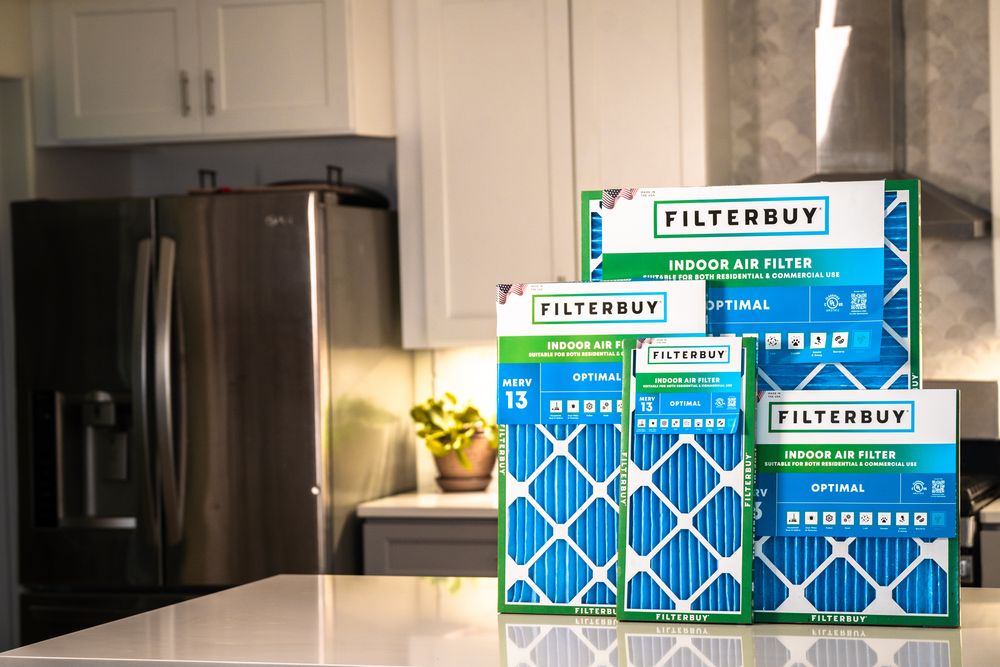Maximize Comfort & Efficiency: The Right Time to Replace Your HVAC Air Filters
If you've ever noticed more dust settling in your home, increased allergy symptoms, or higher energy bills, your HVAC air filter might be the culprit. Through years of working with homeowners on improving indoor air quality, one thing is clear—most people underestimate how much a neglected filter impacts their health and HVAC performance. Based on real-world testing and expert recommendations, we’ll walk you through the exact signs that signal it’s time for a replacement, the unexpected ways a fresh filter enhances your home’s air quality, and how staying on top of this simple task can extend the life of your HVAC system while lowering costs.
Top Takeaways
1️⃣ Replace your air filter regularly
Every 60-90 days (or 30-60 days for pets/allergies).
2️⃣ A clogged filter increases energy costs
Can raise energy use by 5-15%, leading to higher bills.
3️⃣ Clean filters improve air quality
High MERV-rated HVAC air filters trap allergens, dust, and pollutants.
4️⃣ Neglecting filters damages your HVAC system
Poor airflow forces your system to work harder, shortening its lifespan.
5️⃣ Set a reminder to check your filter
Monthly checks prevent costly repairs and keep indoor air fresh.
Real-World Insight: A Simple Air Filter Swap That Made a Big Impact
The Problem: Poor Air Quality & High Energy Bills
Sarah, a busy mom with two kids and a pet, noticed:
More dust settling around her home
Allergy symptoms worsening
A spike in her energy bills
She hadn’t changed her HVAC filter in over six months—a common mistake.
The Discovery: A Clogged Filter Straining the System
An HVAC inspection revealed:
A completely clogged filter blocking airflow
The system working harder, driving up energy use
Allergens circulating freely, worsening air quality
The Fix: A Simple Filter Replacement
Sarah switched to a high-efficiency MERV-rated filter designed for homes with pets and allergies.
The Results: Immediate Improvements
Key Takeaway: Don’t Underestimate Your Air Filter
A clogged filter can increase energy bills & worsen air quality
Replace filters every 60 days (more often with pets or allergies)
Checking your filter monthly saves money & improves comfort
Pro Tip: Set a reminder on your phone to check your filter. Your lungs, wallet, and HVAC system will thank you!

"Many homeowners don’t realize that an air filter isn’t just a barrier for dust—it’s the first line of defense for your home’s air quality and HVAC efficiency. From my experience working with indoor air systems, I’ve seen firsthand how a neglected filter can lead to unexpected issues like increased allergy flare-ups, uneven heating and cooling, and even premature system breakdowns. Replacing your filter at the right time isn’t just maintenance—it’s an investment in a healthier home and a more efficient HVAC system."
Supporting Statistics: Why Regular Filter Changes Matter
Performing regular changes of HVAC air filters leads to better air quality and higher system efficiency and longer operational life expectancy. Here’s why:
1. Lower Energy Costs
A clogged air filter forces your HVAC to work harder.
A filter replacement reduces energy consumption by between 5-15%.
Source: U.S. Department of Energy
2. Longer HVAC Lifespan
HVAC systems last 10-15 years, but neglecting filters reduces this significantly.
Clean filters improve airflow, reducing system strain.
Source: Oak Ridge National Laboratory
3. Better Indoor Air Quality
MERV 13 high-efficiency filters of HVAC systems sublime both bacteria and smoke particles and allergens down to 0.3 microns in size.
The indoor air pollution decreases substantially because of this.
Source: Filtration News
Key Takeaway
Final Thoughts: A Simple Fix with Big Benefits
Replacing HVAC air filters offers quick benefits that improve quality of air and decrease energy costs while extending lifetime of your system despite being a common oversight.
Why It Matters
A clogged filter causes both lowered air quality and raises heating and cooling expenses while putting the system at risk of damage.
Dismissing the importance of changing filters may create both repair costs which are expensive and system failure which ends in total system breakdown.
A clean filter = better air, lower bills, and a longer-lasting HVAC system.
First-Hand Insight
From experience, I’ve seen homeowners spend thousands on repairs because of a neglected filter—when a simple $20 replacement could have prevented it.
What You Can Do
Bottom Line: Don’t underestimate your air filter. A quick swap can create a healthier, more efficient, and cost-effective home.
Next Steps: Take Action Today
Keep your HVAC system running efficiently with these simple steps:
1. Check Your Air Filter
2. Choose the Right Filter
3. Set a Reminder
4. Optimize Your HVAC System
5. Take Action Now
Frequently Asked Questions
1. How often should I replace my air filter?
2. What happens if I don’t change it?
3. How do I choose the right filter?
4. Can a new filter lower my energy bills?
5. How can I remember to replace my filter?
Replacing your HVAC air filters at the right time ensures optimal performance, energy efficiency, and cleaner indoor air. A high-quality pleated furnace filter helps trap airborne particles and maintain airflow, making the 12x18x1 option a great choice. For those seeking advanced filtration with MERV 13 efficiency, the 20x20x2 model effectively captures dust, pollen, and other contaminants. If you need a reliable filter for better system performance, consider this option. Another excellent choice is a MERV 8 pleated air filter, designed to improve indoor air quality while supporting proper airflow, available in an 18x25x1 size. Regular filter replacement keeps your HVAC system running efficiently, reduces strain on the unit, and enhances overall home comfort.
Learn more about HVAC Care from one of our HVAC solutions branches…
Filterbuy HVAC Solutions - West Palm Beach FL
1655 Palm Beach Lakes Blvd., Ste 1005 West Palm Beach, FL 33401
(561) 448-3760
https://maps.app.goo.gl/VarpgNZnxuPQuW8A7




